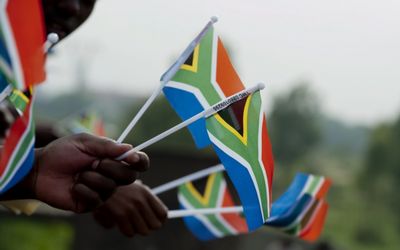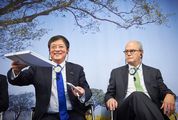ON WEDNESDAY, South Africans will participate in the most seminal democratic act of all: electing a government to lead the country for the next five years. Political parties have worked towards this national election for a while and, come Wednesday, all that work will bear results. This has been dubbed the most exciting election since 1994, with players coming out in full force to etch their place in South African politics.
The media’s role in furthering engagement between political parties and citizens on pertinent issues cannot be stressed enough, especially at this time. With new media redefining political context by further empowering the electorate, our democracy has matured. And whatever happens, the best candidates are those who will take SA furthest, and may they win.
Electioneering has been fiercer than ever. Campaigning has made for great media content and, in the age of blogs, tweets and posts, timeous bloody pictures command attention. When most parties launched their manifestos, the media paid little attention. Unlike in 2009, when we had the likes of Times Media set up dedicated websites focusing on elections, scrutinising manifestos and offering insight, such properties did not pop up this year.
I have come across one such platform this year, www.southafricavotes2014.co.za, run by Khadijah Patel and a team of journalists and techies.
The results of an Ornico media analysis covering the past few months show that less than 30% of coverage in print, broadcast and online media deals with policy issues. The rest is reflective of electioneering, bickering and the exhausting use of rhetoric.
Simply put, politicians have generally not been raising real issues and the media have not been questioning them.
Some key issues that gripped the South African media space just a few months ago, such as service delivery issues over water, did not receive enough media attention, especially over the past few weeks. Protests were silenced and the issues disappeared. For a landmark election marking a 20-year-old democracy, the media have not been active enough to report on such real issues. And this raises the question: is the fourth estate dead?
Statistics point to high voter apathy, particularly among the youth. I am not surprised. After all, which party has really bothered to speak to the youth? And don’t think for a moment that being on Twitter equates to speaking to young people.
Our media analysis at Ornico shows that up to 20% of political coverage is focused on the Economic Freedom Fighters (EFF).
Perhaps this player is one of this election’s game changers, led by political phoenix Julius Malema, who was once despised by the media fraternity and expelled from the African National Congress (ANC).
The irony is that the very media that despised him seems to be supporting him — quite significantly actually.
Media coverage of the EFF has been across the language spectrum and, interestingly, coverage is specifically high in the Afrikaans media.
Granted, policy coverage is virtually completely absent — it accounts for less than 8% of reports on the EFF — but Malema has a platform he probably never expected so soon after having been sent to political Siberia.
Besides Nkandla coverage, the ANC seems to be the loser in political coverage this year. The party’s dominance in previous election periods has shifted, offering a wider spectrum of coverage than the usual ANC-bashing. That should be good, but the question is whether that really matters at this stage of our democracy.
The media are instrumental if any democracy is to succeed. During electioneering, the role of the media is even more important — to interrogate, inform, report and safeguard the interests of the electorate.
In the past two decades, the media have assisted opposition parties, affording them a means to reach out to the public.
To say their entire success is owed to the media would, however, be erratic, and perhaps in that light, some research papers that point to the media as clanging cymbals would be closer to the truth.
The media cannot single-handedly ensure success for politicking, even with social media now more accessible to the majority of South Africans than they were a few years ago.
But their role as an independent watchdog of the people cannot be emphasised enough.
The decline in readership and circulation figures in print media seems to be steady now, and no longer gradual.
Granted, these statistics reflect a reduction in print and do not specify those who have shifted to digital platforms or opted out of engagement completely, but it is clear that the space in which the media plays is changing, and therefore, the media themselves are evolving.
For a young democracy such as ours, this decline, which is not good for the public sphere and for the media as businesses, is concerning.
Despite the decline in print media readership and circulation, advertising has been well used in this election.
Stations such as Talk Radio 702 have been giving political parties opportunities to state their case.
Town-hall broadcasts of two-minute profiles each day are being done, some of which are of poor quality and quite amateurish, but all in all, they are much-needed opportunities for engaging the public.
Thumbs up to radio for this contribution towards a better democracy.
There is not much to say for television except for the banning of opposition adverts by the state-owned South African Broadcasting Corporation for obscure reasons — not just once, but twice — is bizarre to say the least.
In any case, the adverts in question quickly moved to social media: YouTube, blogs, Facebook, for the whole of SA to share, and share they did.
We are also seeing more posters, from more political parties, in relatively better creative and quality production.
While this does not allow for engagement with communities, it at least creates much-needed brand awareness, particularly for smaller parties, which are being shut out by, or cannot afford space in, mainstream media.
While this year is a landmark year for the progression of our democracy, the role of the media need not diminish.
Whatever form or shape the media are evolving towards, they must assert themselves within the public sphere and focus on informing the electorate by reporting on pertinent issues.
Investing in quality reporting and analysis on issues, much like the media did on reporting the Oscar Pistorius trial, must be the only standard acceptable for political coverage.
A high degree of investigation and in-depth scrutiny of political party manifestos and policies is the kind of editorial resource that need to be allotted to political party coverage.
Without this, the media lose the sting this young democracy so urgently needs.
A dying fourth estate leaves us with no means to publicly interrogate our government. It leaves us vulnerable, and that is not good for our democracy.
• Patricios is CEO of the Ornico Group.

Picture: GALLO IMAGES/LISA HNATOWICZ
ON WEDNESDAY, South Africans will participate in the most seminal democratic act of all: electing a government to lead the country for the next five years. Political parties have worked towards this national election for a while and, come Wednesday, all that work will bear results. This has been dubbed the most exciting election since 1994, with players coming out in full force to etch their place in South African politics.
The media’s role in furthering engagement between political parties and citizens on pertinent issues cannot be stressed enough, especially at this time. With new media redefining political context by further empowering the electorate, our democracy has matured. And whatever happens, the best candidates are those who will take SA furthest, and may they win.
Electioneering has been fiercer than ever. Campaigning has made for great media content and, in the age of blogs, tweets and posts, timeous bloody pictures command attention. When most parties launched their manifestos, the media paid little attention. Unlike in 2009, when we had the likes of Times Media set up dedicated websites focusing on elections, scrutinising manifestos and offering insight, such properties did not pop up this year.
I have come across one such platform this year, www.southafricavotes2014.co.za, run by Khadijah Patel and a team of journalists and techies.
The results of an Ornico media analysis covering the past few months show that less than 30% of coverage in print, broadcast and online media deals with policy issues. The rest is reflective of electioneering, bickering and the exhausting use of rhetoric.
Simply put, politicians have generally not been raising real issues and the media have not been questioning them.
Some key issues that gripped the South African media space just a few months ago, such as service delivery issues over water, did not receive enough media attention, especially over the past few weeks. Protests were silenced and the issues disappeared. For a landmark election marking a 20-year-old democracy, the media have not been active enough to report on such real issues. And this raises the question: is the fourth estate dead?
Statistics point to high voter apathy, particularly among the youth. I am not surprised. After all, which party has really bothered to speak to the youth? And don’t think for a moment that being on Twitter equates to speaking to young people.
Our media analysis at Ornico shows that up to 20% of political coverage is focused on the Economic Freedom Fighters (EFF).
Perhaps this player is one of this election’s game changers, led by political phoenix Julius Malema, who was once despised by the media fraternity and expelled from the African National Congress (ANC).
The irony is that the very media that despised him seems to be supporting him — quite significantly actually.
Media coverage of the EFF has been across the language spectrum and, interestingly, coverage is specifically high in the Afrikaans media.
Granted, policy coverage is virtually completely absent — it accounts for less than 8% of reports on the EFF — but Malema has a platform he probably never expected so soon after having been sent to political Siberia.
Besides Nkandla coverage, the ANC seems to be the loser in political coverage this year. The party’s dominance in previous election periods has shifted, offering a wider spectrum of coverage than the usual ANC-bashing. That should be good, but the question is whether that really matters at this stage of our democracy.
The media are instrumental if any democracy is to succeed. During electioneering, the role of the media is even more important — to interrogate, inform, report and safeguard the interests of the electorate.
In the past two decades, the media have assisted opposition parties, affording them a means to reach out to the public.
To say their entire success is owed to the media would, however, be erratic, and perhaps in that light, some research papers that point to the media as clanging cymbals would be closer to the truth.
The media cannot single-handedly ensure success for politicking, even with social media now more accessible to the majority of South Africans than they were a few years ago.
But their role as an independent watchdog of the people cannot be emphasised enough.
The decline in readership and circulation figures in print media seems to be steady now, and no longer gradual.
Granted, these statistics reflect a reduction in print and do not specify those who have shifted to digital platforms or opted out of engagement completely, but it is clear that the space in which the media plays is changing, and therefore, the media themselves are evolving.
For a young democracy such as ours, this decline, which is not good for the public sphere and for the media as businesses, is concerning.
Despite the decline in print media readership and circulation, advertising has been well used in this election.
Stations such as Talk Radio 702 have been giving political parties opportunities to state their case.
Town-hall broadcasts of two-minute profiles each day are being done, some of which are of poor quality and quite amateurish, but all in all, they are much-needed opportunities for engaging the public.
Thumbs up to radio for this contribution towards a better democracy.
There is not much to say for television except for the banning of opposition adverts by the state-owned South African Broadcasting Corporation for obscure reasons — not just once, but twice — is bizarre to say the least.
In any case, the adverts in question quickly moved to social media: YouTube, blogs, Facebook, for the whole of SA to share, and share they did.
We are also seeing more posters, from more political parties, in relatively better creative and quality production.
While this does not allow for engagement with communities, it at least creates much-needed brand awareness, particularly for smaller parties, which are being shut out by, or cannot afford space in, mainstream media.
While this year is a landmark year for the progression of our democracy, the role of the media need not diminish.
Whatever form or shape the media are evolving towards, they must assert themselves within the public sphere and focus on informing the electorate by reporting on pertinent issues.
Investing in quality reporting and analysis on issues, much like the media did on reporting the Oscar Pistorius trial, must be the only standard acceptable for political coverage.
A high degree of investigation and in-depth scrutiny of political party manifestos and policies is the kind of editorial resource that need to be allotted to political party coverage.
Without this, the media lose the sting this young democracy so urgently needs.
A dying fourth estate leaves us with no means to publicly interrogate our government. It leaves us vulnerable, and that is not good for our democracy.
• Patricios is CEO of the Ornico Group.













 News, views and analysis of South Africa's national and provincial elections on May 7 2014
News, views and analysis of South Africa's national and provincial elections on May 7 2014










Change: -0.72%
Change: -0.79%
Change: -2.05%
Change: -0.54%
Change: -0.29%
Data supplied by Profile Data
Change: -1.43%
Change: -0.47%
Change: -0.72%
Change: 0.00%
Change: -0.49%
Data supplied by Profile Data
Change: 1.49%
Change: 1.51%
Change: 1.26%
Change: 1.40%
Change: 1.29%
Data supplied by Profile Data
Change: 0.23%
Change: -0.21%
Change: 0.72%
Change: -1.21%
Change: -2.59%
Data supplied by Profile Data